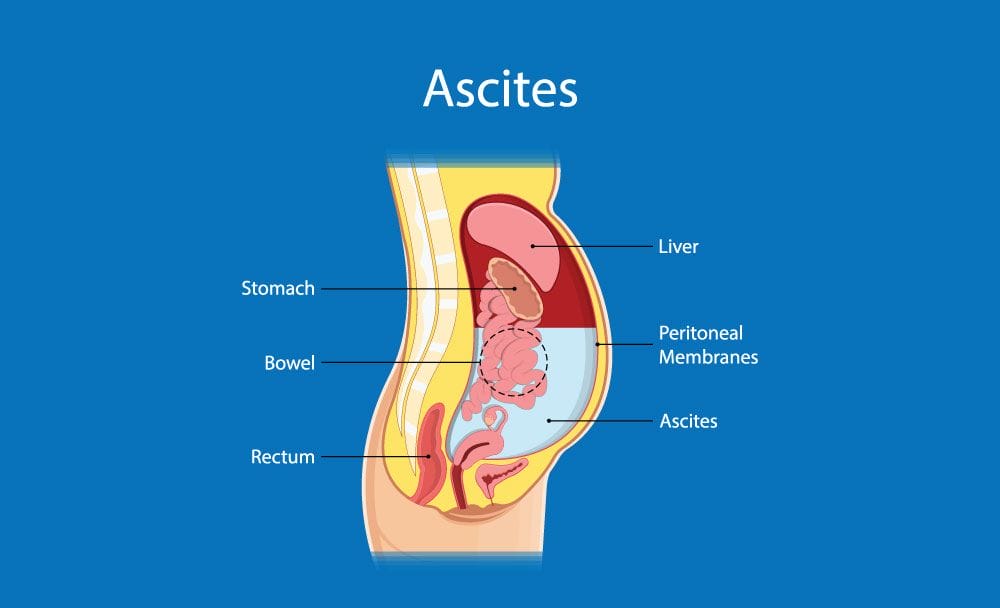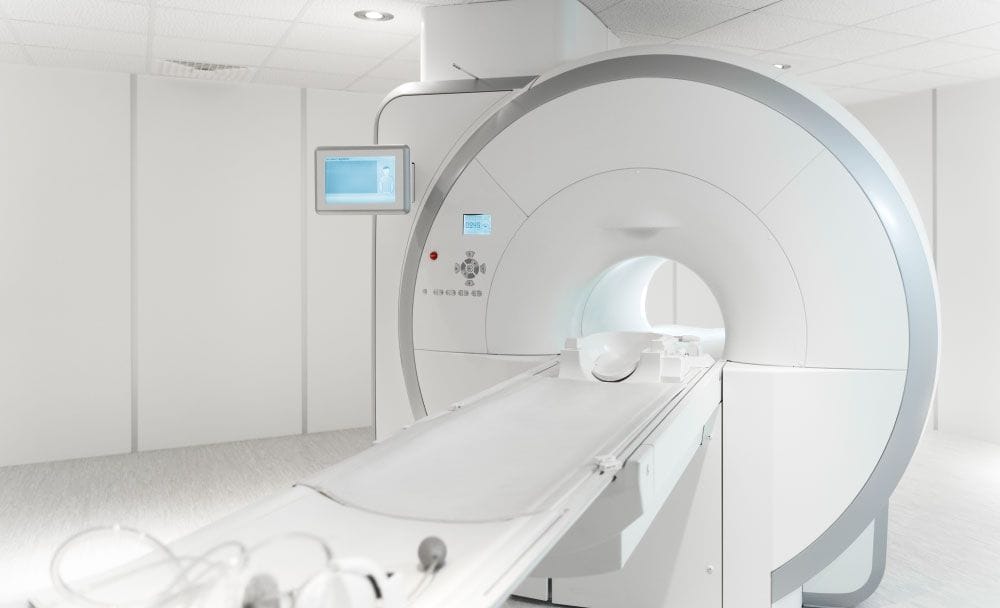Reviewed by Dr. Vipin Bihari Sharma
Ascites or Jalodara is a medical condition characterised by the accumulation of fluid in the abdominal cavity. It is a common complication of several medical conditions, such as liver cirrhosis, congestive heart failure, and cancer. Ascites can cause discomfort, pain, and difficulty in breathing, and they can lead to serious complications if left untreated. [1] In this article, we will discuss the causes, symptoms, diagnosis, and treatment of Ascites.
Causes of Ascites
The accumulation of fluid in the abdominal cavity occurs when the body retains more fluid than it eliminates. The causes of Ascites can be grouped into two categories: portal hypertension and non-portal hypertension.
Portal Hypertension
Portal hypertension is the most common cause of Ascites. It occurs when there is an obstruction of blood flow through the portal vein, which carries blood from the digestive organs to the liver. The obstruction can be due to several medical conditions, such as liver cirrhosis, hepatitis, or thrombosis. When the blood flow through the portal vein is obstructed, the pressure in the portal vein increases, and this leads to the formation of Ascites. [1] [2]
Non-Portal Hypertension
Non-portal hypertension causes of Ascites include heart failure, cancer, and infections. Heart failure can cause Ascites when the heart cannot pump enough blood to meet the body’s needs, and this leads to an increase in pressure in the veins that carry blood to the heart. This increased pressure causes fluid to leak from the veins into the abdominal cavity. Cancer can cause Ascites when cancer cells invade the abdominal cavity or when tumours compress blood vessels, leading to an obstruction of blood flow. Infections, such as tuberculosis or peritonitis, can also cause Ascites. [1] [2]
Accumulation of Toxins(Ama)
According to Ayurveda, the root cause of Ascites is related to imbalances in the digestive fire (Agni) and the accumulation of toxins (Ama) in the body. [3]
Symptoms of Ascites
The symptoms of Ascites depend on the severity of the condition. In the early stages, there may be no symptoms, or they may be mild. As the condition progresses, the following symptoms may develop:
Abdominal swelling
This is the most common symptom of Ascites. The abdominal cavity becomes distended, and the skin may become tight and shiny. [2] [4]
Shortness of breath
Ascites can cause difficulty in breathing, especially when lying down. This is because the accumulated fluid puts pressure on the diaphragm, making it difficult to expand the lungs fully. [2] [4]
Loss of appetite and weight loss
Ascites can cause a feeling of fullness and discomfort, leading to a loss of appetite and weight loss. [2] [4]
Fatigue
The buildup of fluid in the abdominal cavity can cause fatigue and weakness. [2] [4]
Nausea and vomiting
Ascites can cause nausea and vomiting, especially if the buildup of fluid compresses the stomach. [2] [4]
Swelling in the legs
In some cases, Ascites can cause swelling in the legs due to the accumulation of fluid in the tissues. [2] [4]
Diagnosis of Ascites
Ascites is diagnosed through a physical exam and medical history. The doctor will perform a physical exam, looking for signs of abdominal swelling, and will ask about symptoms and medical history. The doctor may also order some tests to confirm the diagnosis and determine the underlying cause of the Ascites. These tests may include:
Blood tests
These tests can check for liver function, infection, and other conditions that may be causing the Ascites.[1] [5]
Imaging tests
Ultrasound, CT scan, or MRI can help visualize the abdominal cavity and identify the presence of fluid.[1] [5]
Paracentesis
In this procedure, a needle is inserted through the skin and into the abdominal cavity to remove a sample of fluid. The fluid is then analyzed to determine the underlying cause of the Ascites.[1] [5]
Treatment of Ascites
The treatment of Ascites depends on the underlying cause of the condition. The goals of treatment are to reduce the accumulation of fluid in the abdominal cavity, relieve symptoms, and prevent complications.[1] [5]
Diuretics
The first-line treatment for Ascites is diuretics. Diuretics are medications that help the body eliminate excess fluid. The most commonly used diuretics are spironolactone and furosemide. These medications work by increasing the production of urine and decreasing the amount of salt in the body. Diuretics are usually prescribed in combination and must be used under medical supervision.[1] [5]
Paracentesis
If the accumulation of fluid is severe, paracentesis may be performed. In this procedure, a needle is inserted through the skin and into the abdominal cavity to remove a large amount of fluid. This procedure can provide immediate relief of symptoms, but it is not a long-term solution. Paracentesis may need to be repeated regularly if there is a recurrence of Ascites.[1] [5]
Fluid and Sodium Restriction
Fluid and sodium restriction may be recommended to help control the accumulation of fluid in the abdominal cavity. Patients with Ascites should limit their intake of salt and fluids to reduce the amount of fluid that the body retains. A dietitian can help develop a plan that meets the patient’s nutritional needs while limiting salt and fluid intake.[1] [5]
Treatment of Underlying Condition
The treatment of the underlying condition causing Ascites is essential to prevent the recurrence of Ascites. For example, if the Ascites is caused by liver cirrhosis, the treatment will focus on managing the liver disease. If the Ascites is caused by cancer, the treatment will depend on the type and stage of cancer.[1] [5]
Surgery
Surgery may be recommended if other treatments are not effective or if the accumulation of fluid is severe. The most common surgical procedure for Ascites is called a transjugular intrahepatic portosystemic shunt (TIPS). In this procedure, a stent is inserted between the portal vein and hepatic vein to redirect blood flow and reduce pressure in the portal vein. This procedure can be effective in reducing the accumulation of fluid in the abdominal cavity.[1] [5]
Complications of Ascites
Ascites can lead to several complications if left untreated. These complications include:
Spontaneous bacterial peritonitis (SBP): Ascites can increase the risk of bacterial infections in the abdominal cavity, leading to SBP. This is a life-threatening condition that requires immediate medical attention. [1]
Hepatorenal syndrome (HRS): HRS is a condition in which the kidneys stop working correctly, leading to kidney failure. This condition is more common in patients with liver cirrhosis and Ascites. [1]
Variceal bleeding: Portal hypertension can lead to the development of Varices ie. swollen veins in the oesophagus and stomach. Varices can rupture and cause severe bleeding, which can be life-threatening.[1]
Prevention of Ascites
The best way to prevent Ascites is to manage the underlying condition that causes it. For example, patients with liver cirrhosis should avoid alcohol, maintain a healthy weight, and follow doctor’s recommendations for managing liver disease. Patients with heart failure should follow the treatment plan and avoid triggers that can worsen the condition. [1] [2]
FAQs
1. Is Ascites a life-threatening condition?
Ascites can be a life-threatening condition if left untreated, as it can lead to severe complications such as spontaneous bacterial peritonitis, hepatorenal syndrome, and variceal bleeding.
2. Can Ascites recur after treatment?
Ascites can recur after treatment if the underlying condition that caused it is not managed effectively. Patients should continue to follow their treatment plan and make lifestyle changes to prevent recurrence.
3. Can Ascites cause pain?
Ascites itself does not usually cause pain. However, the underlying condition that causes Ascites, such as liver cirrhosis, can cause abdominal pain.
4. Can Ascites affect breathing?
Ascites can cause shortness of breath due to the increased pressure on the diaphragm and lungs. Patients may need supplemental oxygen or other treatments to manage this symptom.
5. Can Ascites be diagnosed early?
Ascites can be diagnosed early through routine medical exams and tests, such as blood tests and imaging tests. Early diagnosis can help prevent complications and improve treatment outcomes.
Conclusion
In conclusion, Ascites is a challenging medical condition that can cause significant discomfort and lead to life-threatening complications. Early diagnosis and treatment are crucial for managing the symptoms and preventing complications. Patients with Ascites should work closely with their healthcare team to develop a comprehensive treatment plan and make lifestyle changes to manage their condition effectively. By following their treatment plan and making lifestyle changes, patients with Ascites can live a healthy and fulfilling life.
Disclaimer: This article is from a modern medicine and general knowledge perspective only and does not constitute medical advice. Kindly seek the help of a trained medical practitioner before initiating any treatment.
References:
- Ascites – StatPearls – NCBI Bookshelf (nih.gov)
- Ascites – Symptoms and Causes (pennmedicine.org)
- Critical analysis of Jalodara (Ascites) – A Review
- Ascites – Abdominal Fluid Buildup – Pancreatic Cancer Action Network (pancan.org)
- Ascites: diagnosis and treatment
- Ascitic Fluid Analysis in the Differential Diagnosis of Ascites: Focus on Cirrhotic Ascites – PMC (nih.gov)




















